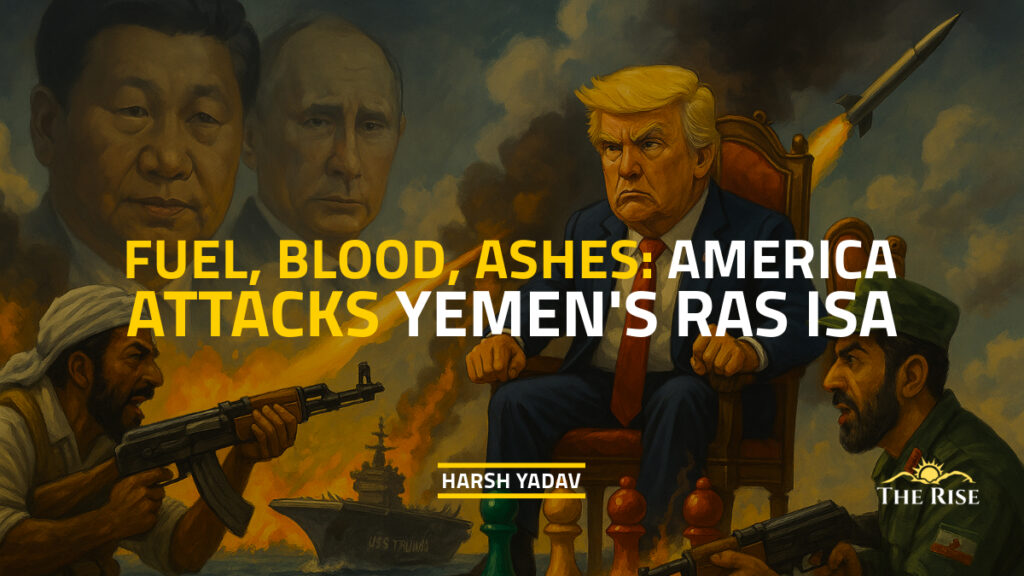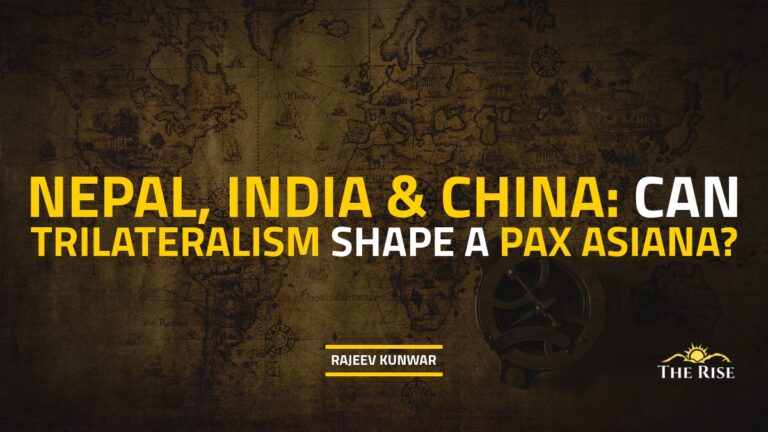The recent American attack on Yemen’s Ras Isa oil pipeline is an act of imperial restructuring. The strike, which the United States has justified as aimed against Houthi’s valuable resources, upends Yemen’s economy, which depends on aid, and feeds a vicious cycle of warfare.
United States conducted an airstrike, according to Houthi sources, on April 17, 2025, killing around 80 people and injuring 171 others in Yemen’s Ras Isa fuel port, a vital hub for petroleum supplies and humanitarian relief. The action was a response to the Houthi disruptions of Red Sea commercial activities and was framed by US Central Command as an attempt to “degrade” the economic strength of the ‘Iran-backed Houthis’. This article attempts to dive deep into the dynamics of the recent episode, which is seen as the deadliest attack in the United States’ fifteen-month-long struggle against the group, to reveal the strikes as a violent act of imperial reconfiguration that solidifies global inequalities and protracts conflict.
Constructing the Houthi Threat: An Act of Securitisation
There is a need to understand how the United States defends the Ras Isa attacks by highlighting the performative and contextual production of threats. The American act of securitisation entails both discursive and non-discursive tactics that mobilise extreme measures by framing a problem as an existential threat. The Houthis, who have been attacking Red Sea vessels since November 2023 in support of Palestinians, are referred to by the United States as “Iran-backed terrorists” who pose a threat to international trade. This narrative, which is reinforced by the language of United States Central Command (CENTCOM), portrays the Houthis as a single threat, hiding both their political agency and the larger background of Saudi aggression in Yemen that the United States has been supporting since 2015. The United States ignores the humanitarian cost of the bombings on Yemen’s 19.5 million aid-dependent population and legitimises excessive bloodshed by securitising the Red Sea.
Also Read: Can BRICS Trump Trump?
The American act of securitisation entails both discursive and non-discursive tactics that mobilise extreme measures by framing a problem as an existential threat. The Houthis are referred to by the United States as “Iran-backed terrorists” who pose a threat to international trade.
Changing the Social Structure of Yemen: War is World-Making
War must be seen as a world-making or an order-making process. The Ras Isa attacks are a violent act that changes Yemen’s social and economic structure to promote American imperial objectives. War should not be seen as only a destructive event in the sense that is linked with the material aspect, but also in establishing new realities and orders that uphold existing power structures across the world. A lifeline for a country ravaged by conflict, the port of Ras Isa handles 80% of Yemen’s aid and 70% of its gasoline supplies.
The wreckage of one of the worst American attacks might bring Yemen’s already precarious economy to a collapse and increase its reliance on outside forces. The bombings undermine Yemen’s sovereignty while ensuring American control over Red Sea trade channels, and thus, war may be used to transform civilisations. As an example of how conflict creates marginalised, exploitable regions, the environmental destruction and oil seeping into the Red Sea further impoverishes coastal people. The intentional reorganisation of Yemen as a subordinate node in the global system is reflected in Ras Isa’s targeting, which is by no means an exact attack.
Alos Read: The Iranian Playfield: American Hostilities, Chinese Investments, Russian Cooperation
Wars establish new realities and orders that uphold existing power structures across the world. The intentional reorganisation of Yemen as a subordinate node in the global system is reflected in Ras Isa’s targeting.
Ras Isa Strikes Conceals a Larger Goal: The Political Economy of Power
The Ras Isa strikes are placed within the global political economy of energy and empire. It is comprehended through the structural power of governments and markets. Dominating knowledge structures, production, money, and security are the keys to power. By attacking Ras Isa’s 3-million-barrel capacity, the United States demonstrates its control over the Red Sea, which is a vital hub for trade and oil movements. Disrupting Houthi revenue is the declared goal, but it conceals a larger goal: ensuring maritime hegemony and limiting Iran’s regional influence.
There is a need to look into the structure of security, which emphasises how American backing for Yemen’s conflict and arms sales to Saudi Arabia maintain a war economy that benefits the defence-related sectors. These attacks deprive individuals and communities of important resources to build up wealth and power, since they demolish Yemen’s infrastructure to increase reliance on Western assistance and authority. As ecological destruction is seen by satellite images, the U.S. claim of limiting civilian impact seems flimsy and is consistent with how global powers transfer costs to weaker governments.
You May Like: Fall of Assad Regime: The Syrian Turmoil and Its Geopolitical Implications
The Cycle of Violence
The strikes are shown as a hub of imperial violence, which were discussed through the above frameworks. The world-making reveals the social restructuring, the structural power reveals the economic motivations, and securitisation clarifies the discursive rationale. Amid Trump’s anti-Tehran rhetoric and US-Iran nuclear talks, the US characterisation of the Houthis as Iranian proxies is a performative escalation that asserts masculinist authority over “unruly” Global South actors. This dehumanisation encourages moral disengagement, which is seen in the quiet around civilian casualties.
By launching missile assaults on Israeli and American targets, the Houthi response solidifies a cycle of violence and strengthens Yemen’s position as a theatre for proxy wars.
By launching missile assaults on Israeli and American targets, the Houthi response solidifies a cycle of violence and strengthens Yemen’s position as a theatre for proxy wars. This cycle contributes to Yemen’s continued marginalisation, which in turn benefits geopolitical elites. The attacks exacerbate Yemen’s problems, stoke regional rivalries, and enrich international elites rather than lessening the Houthis. Rejecting counterterrorism rhetoric and rethinking international relations outside of empire and capital, with a focus on justice and diplomacy rather than violence, are essential components of a critical approach.
Disclaimer: The views expressed in this article are of the author solely. TheRise.co.in neither endorses nor is responsible for them. Reproducing this content without permission is prohibited.
Read the e-print version below:
About the author
Harsh Yadav is a Postgraduate Scholar at the Department of International Relations, South Asian University.







Pingback: Leading-global-south-or-pleasing-trump - TheRise.co.in